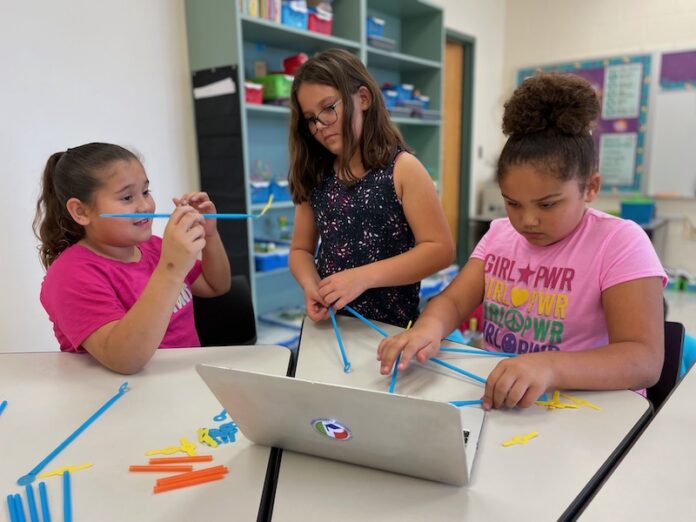Superintendent Kurt Browning calls Florida’s new universal school voucher law an opportunity for his district to shine. The longtime leader of Pasco County Schools on the state’s Gulf Coast calls himself a “champion of choice,” having launched several magnet programs and expanded the advanced Cambridge curriculum from one to 10 buildings.
“You can sit around and bemoan the fact that you’re going to have kids leaving traditional, public K12 systems, and have the state pay for private education,” says Browning, who was named Magnet Schools of America’s 2022-23 superintendent of the year. “I used it as an opportunity to tell my team we need to make sure we’re on our A-game. We want to be our parents’ first choice. We need to be our parents’ first choice.”
Browning, who is one of Florida’s elected district superintendents, believes he and his team have stepped up their game. When he became the leader in Pasco—after having served as Florida’s secretary of state—the district offered a very limited International Baccalaureate program. The district just north of Tampa-St. Petersburg now boasts two early college high schools, three STEAM magnet schools at the elementary level and four STEM magnet programs in middle and high school. Browning started expansion by dividing his district into east, central and west zones and locating programs where they would be most accessible to the most families.
“You have to do that in order to stay relevant,” he adds. “Who would have ever thought a traditional K12 school district could become irrelevant? But I think in Florida, that’s a possibility if you’re just going to keep doing the status quo and think kids are going to come through your doors when the bell rings in August.”
Pasco County Schools, named the College Board’s AP large district of the year in 2020, has also expanded its Advanced Placement offerings by breaking down barriers. His educators have been working harder to identify more students who belong in AP classes but were not getting the opportunities. Most students just want a chance to figure out that they can do it, he points out.
“The research has shown that once they attempt one course and are relatively successful in it, they’ll go back for a second and a third,” Browning continues. “That’s college credit. That’s money in Mom and Dad’s pockets.”
So what keeps Kurt Browning up at night?
Two words: School safety. Since the Parkland shooting in 2018, Browning’s district has spent millions of dollars hardening its 90 schools with fencing, video doorbells, and new door locks, and by creating single points of entry. Next, on the social-emotional side of the safety to-do list, is tightening up Pasco’s cell phone policy, which will be the subject of a public hearing in June.
‘I don’t want that. That’s woke.’
Video: Superintendent Kurt Browning talks about the impact of Florida’s universal vouchers on instruction in public schools.
“Moms want to track their kids; they want to know where their kids are. I get it,” he says. “My concern has been the loss of instructional time. I don’t want kids on cellphones during instructional time.” Here’s what Browning is proposing for students’ use of cellphones:
- Elementary school: Can be in backpacks, but must be silenced at all times
- Middle school: Only during lunch
- High school: At lunch and between classes
Students are also using cellphones for more troubling purposes than distracting themselves during class. Students have made phony threats against their schools via prank calls and social media posts, which forces district officials to devote time to investigating the threats and communicating with the public. Finally, there’s a mental health component to Browning’s attempts to rein in cellphone use, particularly in the attention-seeking behaviors sparked in kids by social media.
“Social media consumes them,” he asserts. “I’ve been off social media for three years now—I find no value in it, none. Some of the stuff that’s out there is really messing with our kids.”
‘We’re not listening to teachers’
Parents have become more engaged, and that’s totally OK with Browning. Pasco is even in the midst of a major community engagement initiative. “We want our parents engaged, and we want them engaged for all the right reasons,” he explains. “Across the country, parents and even people who don’t have kids in our school are attending school board meetings to disrupt and make the process difficult and paint traditional K12 as villainous.”
More from DA: Racial equality in education—Why these states are in the top 10
Browning, who plans to leave his post in 2024, says he pushes back at school board meetings and elsewhere when members of the public make false accusations about his schools. For instance, a parent at a board meeting recently claimed the district was separating students by skin color. “My head almost exploded,” he recalls. “If you don’t push back, then people think it must be true. They like throwing those bombs out there and then it puts the district in the position of having to defend itself.”
That said, Florida’s universal voucher law has forced districts to be customer-service oriented as parents now have more choices, including getting funded for homeschooling. Education in his state is being increasingly dictated by “whatever the parent wants and whatever the parent thinks is best.”
“Do you go to your doctor and tell them that you need heart surgery? No, you listen to the doctor, to the professional,” Browning concludes. “Now, we’re not listening to the professionals in the classrooms, we’re not listening to the teachers.”










